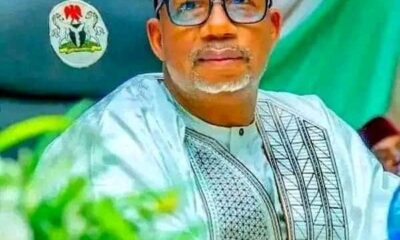Democracy & Governance
Nigeria’s 64th Independence and the Current Economic Hardship -By Abdullahi Adda’u Turawa
The path forward lies in economic reforms, job creation, inflation control, and a commitment to transparency and accountability. With effective leadership, Nigeria can overcome its current difficulties and once again move toward the prosperity envisioned at independence. The potential of this great nation remains vast, but it requires the right policies and leadership to unlock it for the benefit of all its citizens.

On October 1st, 1960, Nigeria gained its independence from British colonial rule, marking the birth of a sovereign nation rich in culture, resources, and potential.
The journey from colonial
moment in Nigeria’s history, celebrated with great hope and expectations. The people believed that self-governance would usher in an era of prosperity, unity, and development. Sixty-four years later, while the nation has made significant strides, it is currently facing a period of severe economic challenges that threaten to undermine the progress it has achieved.
Nigeria, Africa’s most populous country and one of its largest economies, is grappling with record-high unemployment rates and skyrocketing prices of basic necessities such as electricity, fuel, and food. The economic landscape has been increasingly harsh for the average Nigerian, with inflation driving up the cost of living, while wages remain stagnant or nonexistent due to widespread unemployment.
The National Bureau of Statistics (NBS) reported that the unemployment rate in Nigeria surged to over 33% in 2020, with youth unemployment even higher, hovering around 53%. This alarming figure translates into millions of Nigerians, especially young people, struggling to find jobs and support themselves. At the same time, the prices of essential goods have soared. The cost of food items like rice, beans, and bread has nearly doubled in recent years, exacerbating the plight of millions already living below the poverty line.
Adding to this economic stress is the sharp rise in fuel prices, which has had a cascading effect on transportation costs and overall inflation. Nigerians have also faced frequent power outages and high electricity tariffs, despite the promise of reforms in the energy sector. For many, the cost of electricity is unaffordable, leaving them to rely on costly alternatives like generators, further increasing their financial burden.
In the face of these challenges, Nigerians expect decisive action from their leaders. As the nation endures one of its toughest economic periods in decades, the president and the entire leadership of the country must do more than simply acknowledge the suffering of the people. Expressions of empathy and condemnation of the situation, while important, are insufficient to alleviate the growing hardship.
Effective leadership requires a clear and actionable plan to address the root causes of the economic crisis. This includes measures to reduce inflation, create jobs, and ensure access to affordable essential services like electricity and fuel. The government must move beyond rhetoric and implement policies that directly impact the welfare of the citizens.
One of the most critical areas requiring urgent attention is the implementation of economic reforms. The Nigerian government has launched several economic programs in the past, such as the Economic Recovery and Growth Plan (ERGP) and more recently, the National Development Plan (NDP). While these initiatives have shown potential on paper, their execution has often been hindered by bureaucracy, corruption, and a lack of political will.
For the government to truly address unemployment and rising prices, it must prioritize job creation through investments in infrastructure, education, and technology. Diversifying the economy, particularly by developing the agricultural and manufacturing sectors, would help reduce the country’s reliance on oil exports and create sustainable employment opportunities, improving the ease of doing business in Nigeria would encourage both domestic and foreign investment, fostering entrepreneurship and job creation.
Addressing inflation is equally important. The government must work closely with the Central Bank of Nigeria (CBN) to control inflationary pressures, which have been worsened by supply chain disruptions, global economic conditions, and domestic inefficiencies. Reducing inflation requires sound fiscal policies that balance the need for revenue generation with the protection of citizens’ purchasing power.
One of the most immediate ways to tackle the high cost of living is by ensuring that basic services like electricity and fuel are affordable and accessible. Reforms in the energy sector must be accelerated to improve power generation and distribution, reducing the need for expensive alternatives. At the same time, fuel subsidies, which have been a contentious issue in Nigeria, need to be reviewed to ensure that they do not disproportionately benefit the wealthy while leaving the poor in continued hardship.
In times of economic crisis, social safety nets are essential to protect the most vulnerable members of society. The Nigerian government has implemented some social intervention programs, such as the N-Power scheme, which aims to provide temporary employment for young people. However, these initiatives are often criticized for being too limited in scope and reach.
To provide meaningful relief, the government must expand these programs and ensure they are properly funded and managed. Additionally, direct financial support, food distribution, and subsidies for essential goods should be considered as immediate measures to ease the burden on struggling families. Long-term solutions, however, will require a holistic approach to poverty alleviation, including investments in healthcare, education, and housing.
For any of these measures to succeed, Nigeria’s leadership must demonstrate a commitment to accountability and transparency. Corruption has long plagued the country, eroding trust in government institutions and hindering development efforts. Without a clear strategy to tackle corruption, funds meant for economic recovery and poverty alleviation may end up in the wrong hands, exacerbating the already dire situation.
The government must also engage with civil society and the private sector to foster a collaborative approach to solving the nation’s economic problems. Inclusive governance that listens to the concerns of citizens and stakeholders will help build a more resilient and prosperous Nigeria.
As Nigeria reflects on its independence, it is clear that the nation’s current economic challenges require urgent and decisive action from its leadership. The president and commander-in-chief must rise to the occasion, demonstrating more than just sympathy for the suffering of the people. Nigerians need concrete solutions, not just words of condemnation.
The path forward lies in economic reforms, job creation, inflation control, and a commitment to transparency and accountability. With effective leadership, Nigeria can overcome its current difficulties and once again move toward the prosperity envisioned at independence. The potential of this great nation remains vast, but it requires the right policies and leadership to unlock it for the benefit of all its citizens.
The hope is that Nigeria’s leadership will not only recognize the urgency of the moment but also act decisively to create a better future for the millions of Nigerians who are waiting for the promise of independence to be fully realized.
Abdullahi Adda’u Turawa, ANIPR. Wrote from Zaria.









